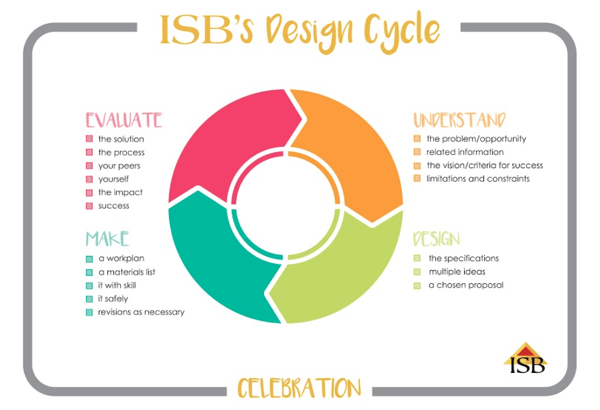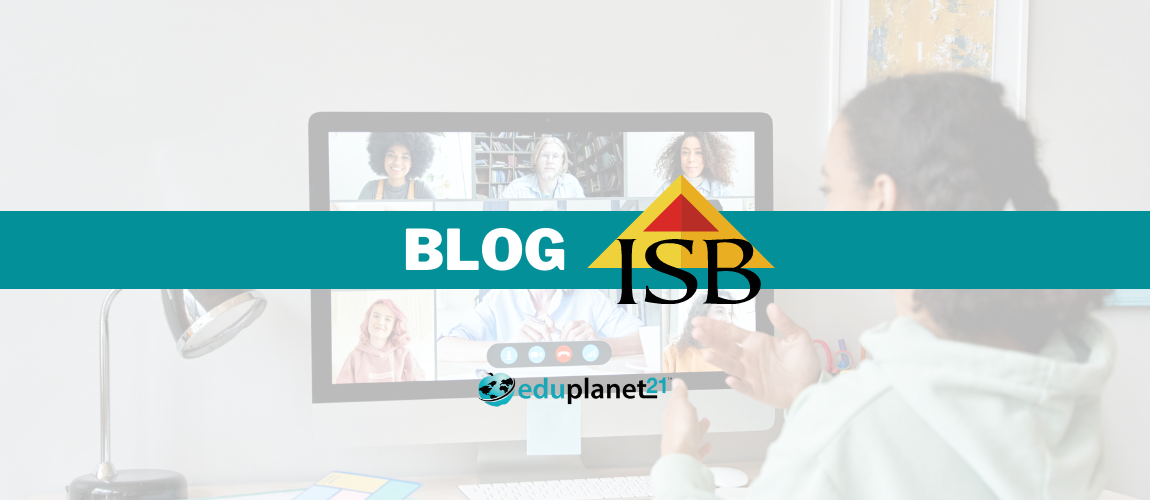June 4, 2020
Virtual School: Using the Design Cycle to Name Some Knowns for Opening the 2020-2021 School Year
Guest Blog post by Jennifer DeLashmutt
Currently, our colleagues around the world are working together within their respective school communities to come up with that picture, plan or map to define “new normal” as we prepare for the 2020-2021 school year. Each day, each Zoom call provides the opportunity for new learning for both children and adults. Keeping up with the pace of questions and answers that lead to even more questions and considerations, can be overwhelmingly daunting for adults during a global crisis. As leadership teams discuss possibilities and parameters, few have committed to an explicit plan for defining “new normal” at this time. At ISB, we are following a design cycle to guide our process as we plan for 2020-2021. We are engaged in the Understanding stage where we collect evidence, by researching, soliciting feedback from students, faculty and parents, listening to podcasts, attending webinars, identifying criteria for a successful transition into the 2020-2021 school year for all of our stakeholders and listing our limitations and guidelines from safety experts.
In addition, we have dipped into the Design stage of our cycle where we brainstorm ideas, analyse our feedback, evidence and research and generate ideas to put forward into a plan. As a leadership team member, I am confident in this process and believe we are right where we need to be in planning for the upcoming school year. Our primary and unapologetic focus areas are the safety and health of our students, faculty, staff and families.
When it comes to teaching and learning, we use the design cycle to guide our planning not only as a schoolwide leadership team, but also in our Learning Design Center (LDC). Through this process, we have begun identifying some of our knowns regarding teaching and learning for 2020-2021. Here is what we are naming as “for sures” while working in our Design stage whether we are on campus or learning virtually:
1) Think of All students as new students for the 2020-2021 school year
Due to the social distancing and virtual school needs at the onset of the upcoming school year, we can think of all of our students as being new to ISB next year. We will need to model, teach and practice new routines that may be different than what we have known as students, faculty and staff at ISB. We will design learning opportunities that continue to embrace flexibility so that we can modify and adapt them based on any new learnings along the way.
2) We are committed to learning about our children socially and emotionally as soon as possible.
We already have embedded plans, systems and programs into our days, weeks and months to learn about our students’ social and emotional health. We will be learning and planning together as a faculty in order to intentionally and intensively support our students and faculty with their social and emotional wellbeing, given the global pandemic and dedicate the time to do so as a part of our orientation for all students.
3) We will be collecting a body of evidence for each of our students as soon as possible.
We have an existing structure to collect evidence at the onset of each school year regarding student progress with a variety of assessments that are both local and standardised to help us see how our students are progressing with their learning goals. We will be adapting this structure to allow for us to collect this body of evidence, analyse the data and create learning plans and goals with students based on their present learning and the learning ahead. We are making our thinking and instructional decision making visible with teams and the LDC during Virtual School so that we leave a record for future vertical collaboration, including next year’s teachers, regarding student progress, unit planning and designing new learning opportunities.
4) New Teacher Orientation and Teacher Preparation
Should our new teacher orientation be virtual, we will be creating a program that our newest teachers will be able to engage with this summer and from anywhere. We have a rich and robust new teacher orientation in place to work with, so we are not having to create a brand new orientation program, rather, we will adapt our existing plans for remote access. Virtual School professional learning will be a component as we plan, including key technology tools, and instructional practices that have been working in Virtual School at ISB. We will continue to support our faculty with professional learning opportunities custom fitted to a virtual context throughout the course of the year.
5) What will students be learning? Prioritizing our standards (learning goals) and studying vertically
As part of our curriculum review cycle, faculty have been studying the standards in each content area. Last fall, we began prioritising our standards, before COVID19 was part of our lexicon. Prioritising standards allows us to make collective decisions around what is essential learning for the current unit and in future units or classes so that we can target that knowledge and those skills effectively. We use Eduplanet21 as our “curriculum house” and there is a feature that allows you to identify your prioritised standards with a simple click! Since this prioritising system was in place, we have been able to modify it and continue these learning focused conversations while in Virtual School. We will be prioritising the standards this summer and fall in Eduplanet21 for the units of study planned for the beginning of the year, as well as preparing for virtual school for a few, many or all of our students when the 2020-2021 school year commences. This prioritisation allows us to respond to student learning needs in real-time, where they are.
As I reflect upon this Virtual School experience thus far, it has certainly put my commitment to life-long learning and to continuous improvement into the fastest lane! Daily, it is reinforced that it is not about just content knowledge, or how much you know, because we can indeed, “Google it”. We are experiencing authentically, that it is paramount that we know what to do with that content knowledge or what we know, and that we know how to learn.
I am grateful for the opportunity to practice perseverance, learn alongside my own children, and embrace our ISB attributes as an adult learner. By using a design cycle, we provide the opportunity for creativity, social intelligence, adaptability, global mindedness, self-regulation and being value driven to give shape to our knowledge, skills and new learning.

About Jennifer Knight DeLashmutt
Jennifer is the Director of Curriculum and Professional Learning at International School Bangkok. Prior to moving to Bangkok, she was the Upper Primary Principal at Hong Kong International School in Hong Kong. Recently, Jennifer received her Certification in Advanced Educational Leadership (CAEL) from Harvard’s Graduate School of Education and has just submitted her portfolio as a member of the Bangkok Cohort for the ISTE Educator Certification. “I am so very grateful to learn from and with so many brilliant, creative and thoughtful educators all over the world who want to do right by our children.”
 Login
Login
